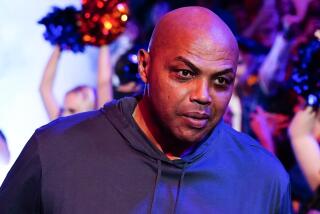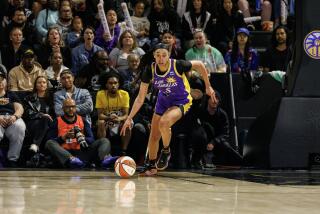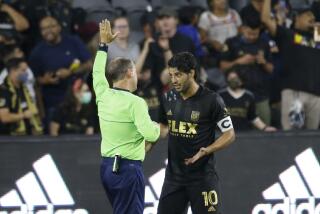NBA locks out its players after negotiations on labor deal fail
- Share via
In what could be a bigger threat to its season than football’s current labor stoppage, the NBA imposed a lockout of players at 9:01 p.m. Pacific time Thursday.
“We didn’t see any options,” NBA Commissioner David Stern told reporters earlier Thursday after a three-hour meeting between owners’ representatives and union leaders in New York failed to produce a new collective bargaining agreement.
“I don’t think we’re closer,” Stern said. “We have a huge philosophical divide.”
“Owners might think this is the best way to get what they want. We don’t agree,” Derek Fisher, the Lakers guard and president of the National Basketball Players Assn., told reporters.
Unlike the NFL’s labor dispute over how to divide up an extra $1 billion in TV revenue, the NBA says 22 of its 30 teams are unprofitable and that the league lost about $300 million last season. This despite a reported $4.3 billion in revenue and record television ratings last season.
To fix their financial problems, NBA owners want to sharply cut the players’ 57% share of basketball revenue, established in the last labor deal, impose a stronger salary cap, reduce guaranteed contracts and lock players into a 10-year collective bargaining agreement — double the length of the last deal.
The players have offered to cut their share of revenues to 54.3% and give up $500 million in revenue for the five seasons, a gesture Stern had dismissed as “modest.”
This the NBA’s third labor stoppage, and the first since a shortened 50-game regular season in 1998-99. The lockout also stops contact between NBA teams and players, halts the scheduled start of free agency on Friday and any team organized activities such as the summer league.
Some legal experts said the NBA is attempting to fix a financial problem of its own doing without effective revenue sharing between big- and small-market teams.
Although NFL teams share equally their billions in network television revenue, NBA teams are free to negotiate and pocket their own regional television deals, such as the Lakers’ recent 20-year deal with Time Warner Cable that some value at $3 billion.
The disparity in local TV deals, and a gap in ticket prices, creates the chasm between the NBA’s haves and have-nots, said Dan Lazaroff, a sports law professor at Loyola Marymount University.
“That’s not a workable business model,” Lazaroff said. “And that’s a subject for discussion” in negotiations.
The NBA wants “an economic system where all 30 teams could compete for a championship,” NBA Deputy Commissioner Adam Silver said.
But the union said the NBA’s most recent offer — guaranteeing the players
$2 billion annually over a 10-year agreement — amounts to a 12% pay cut for players.
Instead, the union says the NBA could strengthen the league with a bigger revenue sharing plan.
“They’re going to lock us out,” Billy Hunter, executive director of the NBAPA, said to reporters, after the last-ditch negotiating session Thursday. “Maybe we can now really begin to negotiate. The clock is now running with regard to whether or not there will be a loss of games, and so I’m hoping that over the next month or so that there will be sort of a softening on their side and maybe we have to soften our position as well.”
For now, it doesn’t seem Hunter will follow the NFL players’ playbook and decertify his union and take the labor dispute to federal court. Hunter said he plans to meet with NBA officials again within two weeks.
Meanwhile, players must deal with a lockout.
“It’s unfortunate for the players, for the owners and for the fans,” said former Lakers guard Shannon Brown. “None of us want to stop playing basketball, a game that we all love.”
Brown opted out of a contract Thursday that would have paid him about $2.37 million next season. He’ll become a free agent in uncertain times because no one knows when a new labor deal will be reached.
“Basketball saved my life. It gave me options and kept me off the streets,” Brown said. “It kept me grounded and gave me direction. Basketball has paid off for me. So I want to keep playing basketball. I hope we can settle on an agreement that’s good for everybody.”
twitter.com/latimespugmire
Pugmire reported from Los Angeles. Times staff reporter Broderick Turner contributed to this report.
More to Read
Go beyond the scoreboard
Get the latest on L.A.'s teams in the daily Sports Report newsletter.
You may occasionally receive promotional content from the Los Angeles Times.











